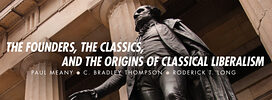Lead Essay
Paul Meany begins the discussion with an appreciation of Cicero, the Roman orator, statesman, and philosopher whose works were central to the western intellectual canon as the American Founders understood it. Though Cicero is rarely read today, he exerted a strong influence both on the Founders directly and on John Locke, another of their key influences.
Response Essays
Roderick T. Long argues that the American Founders’ classical influences were not limited to Roman republicanism. He faults them, however, for too readily dismissing Athenian democracy, which, contrary to its reputation, was surprisingly stable. Certain Founders also explored ancient ideas of a stateless society, in part prompted by their own experience of state disruption during the Revolutionary War.
C. Bradley Thompson notes several threads in the Founders’ understanding of the classics, including a deep mistrust of Plato and an admiration for Cicero’s idea of the republic, in which preserving the property of the people was taken as the main business of government. The ancients’ moral ideas, however, were perhaps the most important. It is here, he suggests, that the truest link between the ancient and the modern idea of liberty is to be found.

